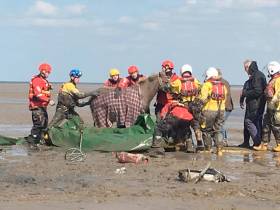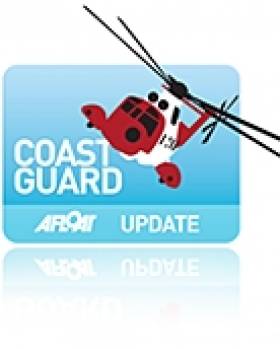Displaying items by tag: Wirral
Horse riders and owners have been warned over taking their animals to beaches or mudflats after two separate rescue incidents in the UK in recent days
Last Saturday (13 April) two horses and their riders were rescued from thick mud after they became stuck while riding on the Wirral coast near Liverpool.
Hoylake RNLI’s hovercraft joined Flint and Wirral Coastguard Rescue among the emergency services at the scene on Saturday morning, which saw one of the horses stuck up to its belly in very thick mud.
Emergency services tried digging around the horse to free its legs to no avail. The RNLI crew and coastguard also used their mud lances in an attempt to soften the sand with water and compressed air, but the mud proved too thick for this equipment.
After some further digging, and with gentle encouragement from the emergency services, the horse managed to free itself but became stuck again.
Finally, mud boards and mats were deployed to provide the horse with some firmer footing.
The horse was freed again and managed to climb onto the boards with some assistance. A vet on the scene then administered a sedative to avoid any further distress to the animal and to help the emergency services to move it to shore safely.
“Considering the ordeal the horse had been through, its behaviour was exceptional in what was clearly a distressing situation,” said Hoylake RNLI crew member Ian Farrall. “The emergency service teams worked really well together, pooling their resources and experience to ensure a good outcome in very difficult circumstances.”
The following day, HM Coastguard received 999 calls reporting a horse and rider in distress and stuck in the mud at Burnham-on-Sea beach in Somerset.
Fortunately the rider was not injured but the coastguard launched a multi-agency response to recover the horse and keep the rider safe before the rising tide covered the area.
Gemma Griffiths, the senior maritime operations officer who was co-ordinating the incident in Somerset, offered safety advice for walkers and riders as the longer days come in.
“Take care when walking or riding over these big expanses of tidal sand or mud and consider getting guidance from someone with local knowledge if you are at all unsure about your route.”
Liverpool Coastguard Closure 'Will Put Safety at Risk'
A British MP has criticised plans to close Liverpool's coastguard station as 'dangerous'.
The Liverpool command centre - which also covers the Irish Sea - is one of eight that face the axe under revised proposals to streamline Britain's coastguard network that saved Belfast's search and rescue station from the axe.
Wirral MP Angela Eagle said the move "is all about saving money, not safety" and "will put safety at risk".
She told the Wirral Globe: "There’s still 12 weeks of consultation. But there real issues which need to be addressed. For example, a coastguard operator based in Northern Ireland will know nothing about what’s going on in Liverpool Bay.
"We have a huge maritime history and it’s being eroded by these cuts.”
The Wirral Globe has more on the story HERE.
































































